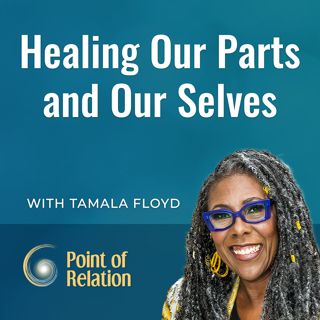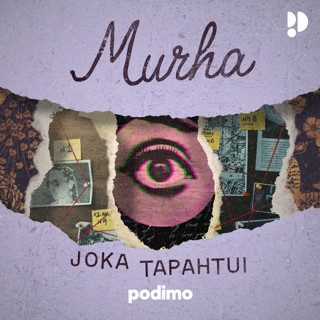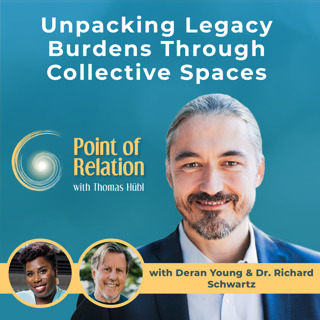
Deran Young and Dr. Richard Schwartz - Unpacking Legacy Burdens through Collective Spaces
What are legacy burdens?These are ingrained parts of us that involve extreme beliefs and emotions coming from traumatic experiences inherited from family or other people.This is mostly experienced by people in marginalized groups. And unpacking them takes courage, acknowledgment, and a safe space to open up.Listen as Dr. Richard Schwartz and Deran Young share their expertise and experiences in navigating through intergenerational trauma and un-learning past beliefs.▶️Unpacking Legacy Burdens through Collective Spaces with Deran Young & Dr. Richard SchwartzKey Points To Discover:✔️ Your trauma isn’t your identity. When your pained inner child starts to hijack your emotions, it’s important to separate it and allow your higher self to take over. “That one part of us doesn’t have to dominate our life,” Deran Young says.✔️Foster a culture of healing in shared spaces. While some are far in their journey of inner work, others still need an extra boost. What are the rules in the communal space? How do we respect each other? How do we honor our differences and similarities? It’s important for all to feel a sense of comfort and belonging when it’s time to unpack trauma.✔️ Identify your “exiles”. These vulnerable parts greatly impacted by trauma are called “exiles” – our spaces for creativity and desire that were hurt and are pushed away. This makes us feel like we’ve moved on. But in reality, these “exiles” still have an underground influence over our decisions and overall worldview.✔️ The best healing happens in collective spaces. It’s normal to feel alone when grappling with deep trauma. This is why Deran Young recommends looking for groups where you can share your experience and feel a sense of community. This is where people can start to acknowledge their trauma and speak more compassionately to themselves.✔️ Everyone deserves access to healing. Economically marginalized places may not have access to the tools needed to treat inner wounds. Forms of psychedelic-assisted therapy – trauma healing using natural resources from the land – have existed for generations. Each person in the world has the right to utilize it for their improvement.✔️Bring your exiled parts back home and reconnect. Dr. Richard Schwartz emphasizes that we shouldn’t disconnect these traumatized parts of ourselves, but rather recognize and acknowledge their presence for healing to take place.---------------Dr. Richard Schwartz began his career as a systemic family therapist and an academic. Grounded in systems thinking, Dr. Schwartz developed Internal Family Systems (IFS) in response to clients’ descriptions of various parts within themselves. He focused on the relationships among these parts and noticed that there were systemic patterns to the way they were organized across clients. He also found that when the clients’ parts felt safe and were allowed to relax, the clients would spontaneously experience the qualities of confidence, openness, and compassion that Dr. Schwartz came to call the Self. He found that when in that state of Self, clients would know how to heal their parts.A featured speaker for national professional organizations, Dr. Schwartz has published many books and over fifty articles about IFS.---------------Deran Young, LCSW, MPA, has served in the US Air Force for over sixteen years. She is a world traveler and has visited over thirty-two countries and provided counseling services in three different nations in Europe and Africa. Her clinical training and experiences have primarily focused on trauma, PTSD, depression, anxiety, child abuse, and domestic violence.Deran is the founder and CEO of Black Therapists Rock (BTR), an organization
21 Helmi 20231h 6min
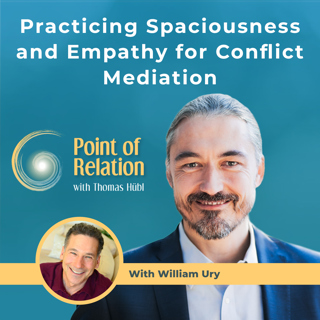
William Ury - Practicing Spaciousness and Empathy for Conflict Mediation
"The single biggest block to getting a yes in any kind of conflict is yourself,” says author and expert negotiator William Ury.In this episode, William Ury shares his expertise in demonstrating spaciousness and empathy in conflict-laden situations, mediation as an intrapersonal exercise, and dissecting trauma in an unsettled society.▶️ Practicing Spaciousness and Empathy for Conflict Mediation with William UryKey Points to Discover: ✔️ Practice the palm pinching technique. Standing in the middle of conflict can be terrifying. Step back and find perspective within by pinching your palm. “It gives you momentary pain, but it’ll keep you alert,” William Ury retells.✔️Befriend your emotions. Trauma brings about emotions we perceive as negative – such as anger, resentment, jealousy, hatred, and fear.William Ury says, “Befriend these emotions. Welcome them. Don’t judge them. Host them. Don’t suppress them.” Every emotion contains a message. If we’re open and paying attention, we can better understand it.✔️ Conflicts have three sides. The third side is called the whole – the larger community to which the two parties belong. “It’s not a conflict between individual A and individual B. It’s a collective,” he explains. This unseen side holds a huge responsibility to mediate and gather the two parties to reach a resolution.✔️ Empathy requires putting yourself in your own shoes. It’s hard to put yourself in others’ shoes when you have preconceived ideas about them.Be in a place of clarity and gather as much information as you can about the conflicts you witness. This is where real and deep empathy begins.✔️ The absent parts of ourselves are filled with the past. When we aren’t fully integrated with the painful experiences of others, it blocks us from developing genuine empathy, and we might instead find that we’re filled with fear, physical tension, and numbness. Healing from intergenerational trauma requires us to feel the fears of our ancestors – merging them into our present flow. This allows us to cultivate greater empathy for the people in our lives.✔️ Mediation means seeing a way forward. Finding the way forward in conflict calls for inner spaciousness. As a mediator, William Ury recommends taking a step back and viewing the situation from what he calls “going to the balcony” - a removed position from which we can be more present, empathetic, and objective. Take off the blinders of your own biases and see the larger picture.---------------William Ury is one of the world’s leading experts on negotiation and mediation. As the co-founder of the Program on Negotiation, he is a driving force behind many new negotiation theories and practices. Ury is the co-author with Roger Fisher and Bruce Patton of Getting to Yes, a 15-million-copy bestseller translated into more than 35 languages, and the author of several other books including the award-winning Getting to Yes with Yourself.Over the last four decades, Ury has served as a negotiation advisor and mediator in conflicts ranging from the Cold War to ethnic and civil wars in the Middle East, Chechnya, Yugoslavia, and most recently in Colombia, where he serves as a senior advisor to President Juan Manuel Santos. In addition to teaching negotiation and mediation to tens of thousands of executives, Ury is the founder of the Abraham Path Initiative, which seeks to bring people together across cultures by opening a long-distance walking route in the Middle East that retraces the footsteps of Abraham and his family. In recognition of his work, he has received the Cloke-Millen Peacemaker Award, the Whitney North Seymour Award from the American Arbitration Association, and the Distinguished Service Medal from the Russian...
21 Helmi 202358min
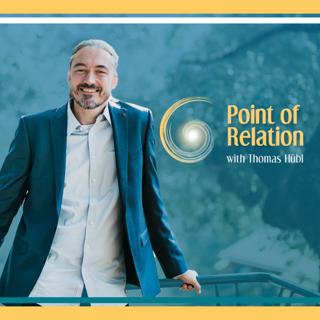
An Invitation from Thomas Huebl
We are incredibly excited to launch our new podcast – 𝐏𝐎𝐈𝐍𝐓 𝐎𝐅 𝐑𝐄𝐋𝐀𝐓𝐈𝐎𝐍. In these episodes, Global Healing Facilitator Thomas Huebl aims to explore the ancient and contemporary topics melding in the zeitgeist of our time and find the sweet spot of our relational experience. ✴ Here is a space we behold and can bravely explore the boundaries of that which we already know. ✴ Here is where we can learn more about how our lives intersect with the future and observe the convergence of the conscious and unconscious realms. ✴ Here is where we enter an expanded territory coming into a place of freshness, innovation, and inspiration.By doing this together, through the episodes of this podcast, we can find a greater understanding of life and take away learning that we may not have even known we wanted or needed. Ultimately, Thomas aims to leave us each feeling uplifted, energized, connected, and creative.🎙️ https://pointofrelationpodcast.com/ #Transformation #Abundance #Scarcity————————————————————————————————Thomas Hübl is a renowned teacher, author, and international facilitator whose lifelong work integrates the core insights of the great wisdom traditions with the discoveries of science. The focus of his work is collective trauma and global healing. Webpage: https://thomashuebl.com/Facebook: https://www.facebook.com/Thomas.Huebl.SanghaLinkedIn: https://www.linkedin.com/in/thomashuebl/Instagram: https://www.instagram.com/thomashuebl/Youtube: https://www.youtube.com/thomashueblTwitter: https://twitter.com/thomasHuebl "Healing Collective Trauma" is an award winning book by Thomas, published in five languages. https://www.collectivetraumabook.comMentioned in this episode:Pulling the Thread Ad
20 Helmi 20236min
